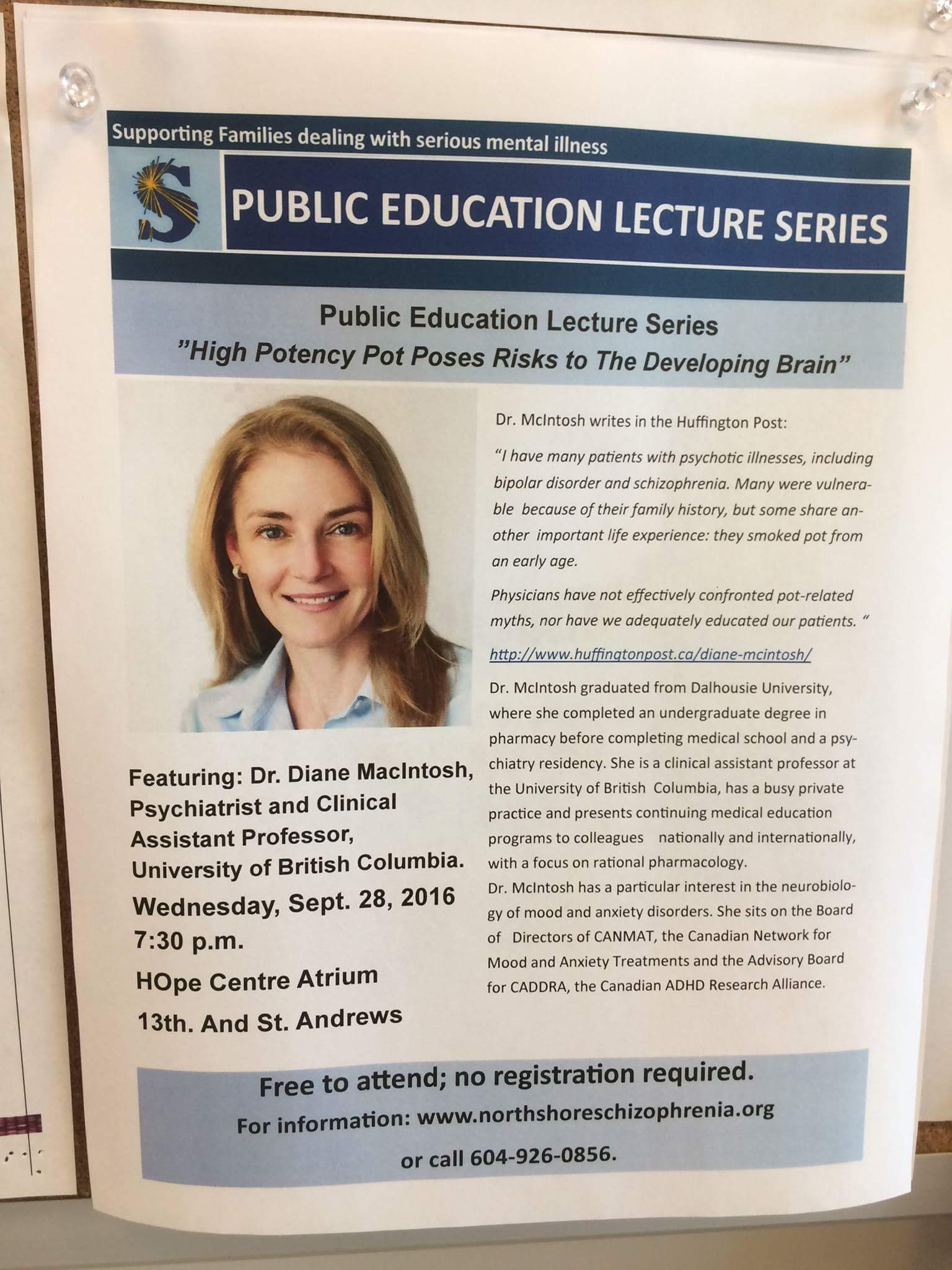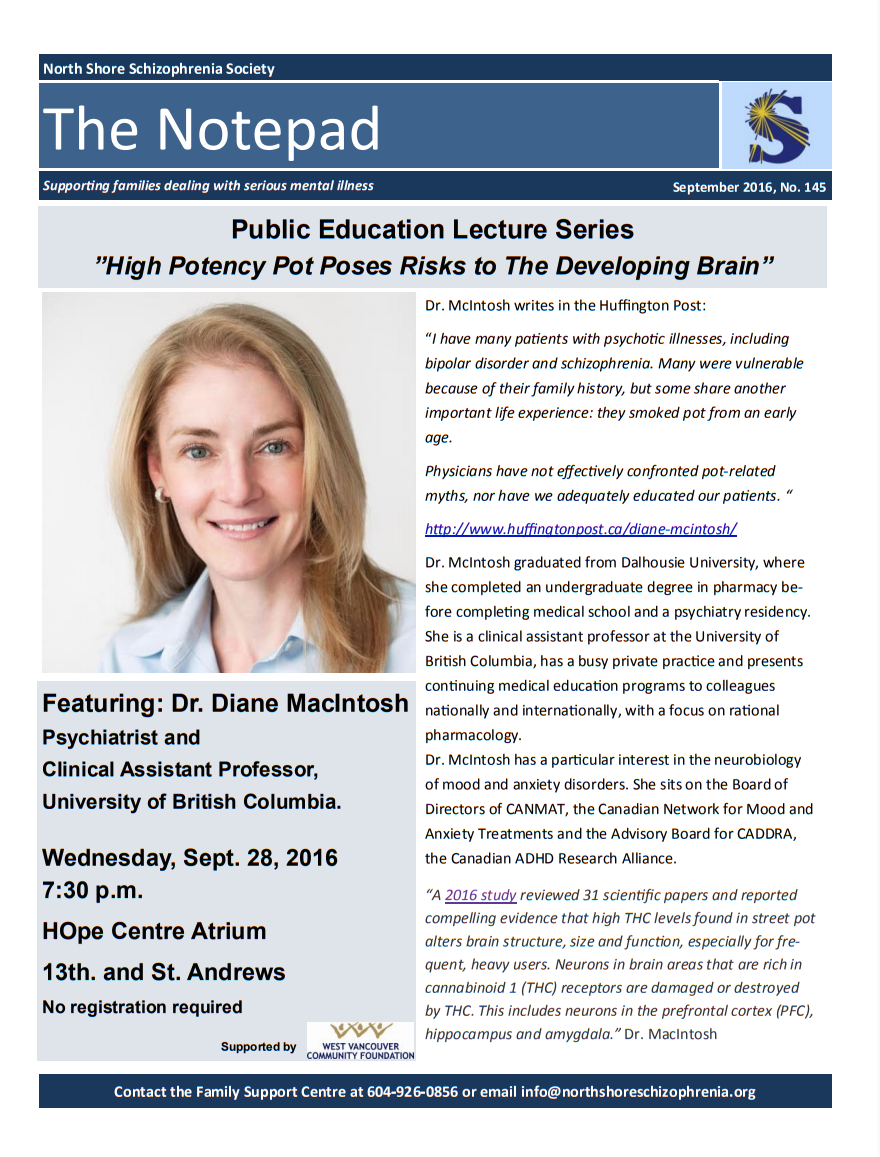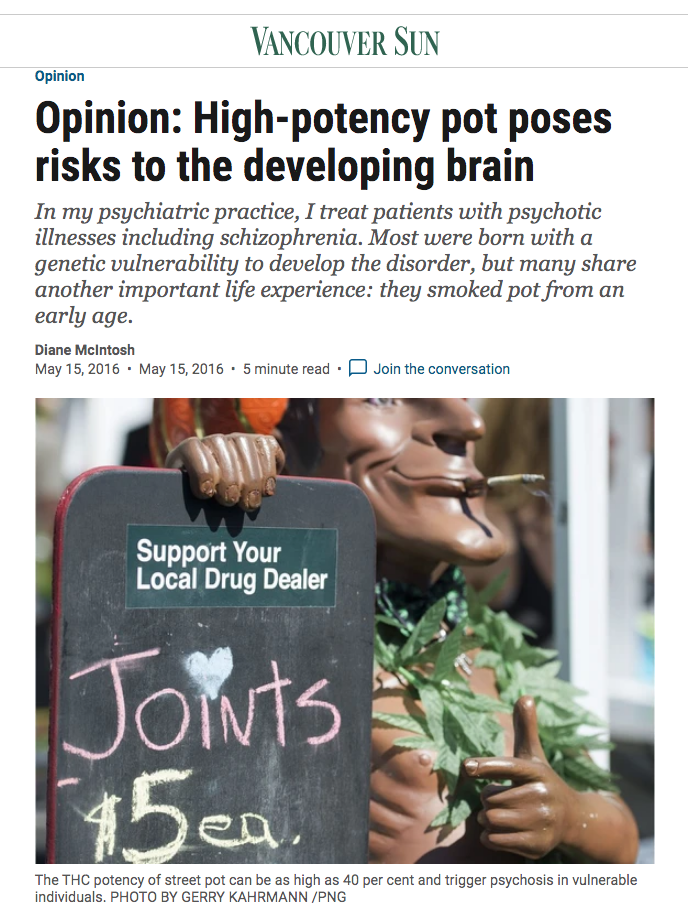My Sad and Frightening Evening with Dr. Diane MacIntosh

The incident in this article, although a few months back, it remains relevant and will continue to be relevant as long as the Prohibitionist side pushes lies and false science onto the public.
Allow me to introduce you all to one of the most effective liars on their side – she’s attractive, well-spoken, good at what she does, resides in the heart of the Canadian West Coast activist scene and unless you’re prepared for her, she will crush you in a debate: Dr. Diane MacIntosh.
I know this because I’ve faced her. And below, I’ll tell you all the where’s and whys of how it happened..
It was a soggy Pacific Northwest evening, typical for late fall. I wandered my soggy self into the “HOpe Center Atrium” (named that way for it’s namesakes: Robert and Greta Ho) in North Vancouver. I was there to attend the “High Potency Pot Poses Risks to The Developing Brain” lecture, I had a feeling of trepidation overcome me as I dripped dry in the threshold.

 Other than me, there was only one young person at the meeting – she looked like she was too young to be there on her own. The rest were gray haired folks, and perhaps a few psychiatrists in their 40s thrown in to the mix – mostly people raised in the 1950’s and 1960’s …prime age for indoctrination into “reefer madness” – the super-charged “let’s get all our pot information from a pill pusher who’s never tried pot” type of madness.
Other than me, there was only one young person at the meeting – she looked like she was too young to be there on her own. The rest were gray haired folks, and perhaps a few psychiatrists in their 40s thrown in to the mix – mostly people raised in the 1950’s and 1960’s …prime age for indoctrination into “reefer madness” – the super-charged “let’s get all our pot information from a pill pusher who’s never tried pot” type of madness.
Still, it was worse than I imagined it would be. Enter Diane MacIntosh.
Her bona-fides are an undergraduate degree in pharmacy and a degree in psychiatry. She is a clinical assistant professor at UBC, has a busy private practice and teaches psychiatry and “rational pharmacology.”


She sits on the board of Directors of CANMAT – the Canadian Network for Mood and Anxiety Treatments and the Advisory Board for CADDRA, the Canadian ADHD Research Alliance. She has just begun to blog for the Huffington Post.
She started off with the standard canard. I didn’t record her exact words, but she basically said, cannabis is much more potent these days and is thus more dangerous than before.
She makes the same argument in her blog (here I was recording): “In my April 8 blog, I explained that due to selective breeding the potency of THC in street pot has risen exponentially. This has inversely mirrored the reduction/elimination of cannabidiol, the purported antipsychotic, anticonvulsant, neuroprotective component of cannabis (the evidence for its benefits is mixed but promising). I have argued that THC is pro-psychotic.” She provides a link to a study as evidence of her point.

She continued by saying, ““There is a shift in the production of illicit cannabis plant material from regular marijuana to sinsemilla. This increase in potency poses higher risk of cannabis use, particularly among adolescents.”
Now here is where I get fired up.
What she doesn’t tell you, and what the study doesn’t tell you, is that hashish is a “high potency” cannabis product and it’s been available – everywhere – for centuries. In fact, for many years, you could only get hashish – marijuana flowers weren’t easy to find until the late 1990’s for much of Canada. At least that was my experience growing up in Edmonton, Alberta, and smoking as much hash as I could get my hands on from 1985 onward.
The fact of the matter is, since the 1960’s, teens all over North America have been taking heroic-dose knife hoots off massive amounts of quite potent hashish until they were forced to lie down and watch eyelid cartoons for two hours … but I.Q.s have not been falling and psychosis rates have not been increasing as a result.
I wanted to tell her this, but I also wanted to hear the rest of what she had to say without affecting her presentation by challenging her too early … so I bit my tongue and waited.
At the beginning of the lecture she requested that people put up their hands for clarification. A few people asked her a few questions – nobody was challenging her on her premise. She got around to talking about how rates of schizophrenia in Canada were at 1%. I decided, finally, to put up my hand.
“You say that rates of schizophrenia in Canada were about 1%. Do you have any data to suggest that that rate has changed since the 1960’s?” I asked.
“That data isn’t available” was her reply.

“In Macleod et al. (2004) they looked at data from Britain and Sweden and they didn’t
find an increase.” came my retort.
“THC is one of the causes of psychosis but it’s not the only one … and it may only cause psychosis in a small number of users.” she responded.
“Have you heard of a study called “Rat Park” from 1981 from Simon Frazier University?” I interjected.
“No.”
“It compared the results of testing rats in cages vs. testing rats in a nice park they could be social and have fun in, and they found the rats in the park didn’t do drugs nearly as much as the one trapped in cages. Rat Park has led many people from the researcher field to understand that researcher bias can be the most important factor in drug testing … and that injecting rats with pure THC can result in different conclusions than observing cannabis users using cannabis properly in their natural habitat.”

Image from https://www.stuartmcmillen.com/comic/rat-park/#page-30
“Researcher bias can be found in both anti-cannabis and pro-cannabis literature”. she replied. I’m paraphrasing, but that was the essence of her argument.
Because the moderator had decided I had used up all my follow-up questions, I was shushed and Dr. McIntosh (she spelled her name differently in her blog post than on her lecture announcement) continued with her presentation.
I did feel compelled to speak up again when she trotted out the gateway theory. She said “I asked my patients who used hard drugs if they had ever used cannabis – and nearly all of them had said they had.”
“Did you ask them if they had used caffeine?”
“That’s not the same thing.”
“Why isn’t it the same thing?”
Then the moderator came over and I was hushed again. Dr. McIntosh ignored my question and continued with her presentation.

I spoke up one last time when some mother blamed her son’s suicide on cannabis. I told her I was concerned about the handful of teens that died every year from cannabis raids and botched arrest attempts – like the time Daniel Possee died in a raid in North Vancouver in 1992 over a half ounce of cannabis. The deaths from cannabis raids were real, the connection between cannabis and suicide was speculative.
“Shhh.”
Moderated again.

At the end of her lecture I applauded with the rest, and then I approached her and gave her a copy of the book I wrote on this subject.
I wrote this book on this subject. You might find it useful in some way.”

Image from https://www.cannabisculture.com/content/2014/11/11/does-cannabis-inherently-harm-young-peoples-developing-minds/
She took it and thanked me for it. She was much more pleasant a person than “Smart Approaches to Marijuana” anti-pot activist Pamela McColl … which is what frightened me.
She sounded rational to anyone who hadn’t taken the time to inform themselves on the issue. She had the audience eating out of the palm of her hand. She sold modern-day reefer madness and made it sound respectable. Unlike other lower-mainland of BC prohibitionists I had encountered before, she was good at what she did. I have a feeling that this will not be the last time she will be making her claims about cannabis in public. I hope our community continues to challenge her to back up what she says, regardless of how effective this “direct confrontation” approach seems to be at the time.

Ultimately, we get the type of legalization we settle for.
If we allow our type of legalization to be shaped by lies, then the most vulnerable people of all:
1) the young who suffer under continued “post-legalization-prohibition” and
2) the poor who can’t afford to jump through the regulatory hoops created by “pot makes kids crazy” propaganda – will continue to be brutalized in the name of public health.
Keep your eyes on Dr. Macintosh, I suspect she’s got many more bitter pills to jam down our throats, even as the science she uses to justify it misses the mark.



